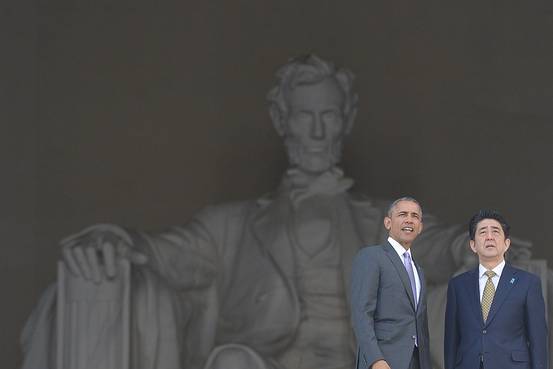Courting controversy for his refusal to issue a formal apology from Japan to South Korea and other Asian neighbors whose nationals were conscripted into service as ‘comfort women’ during World War II, Japanese prime minister nevertheless embraced the United States in a joint address to the US Congress Wednesday:![]()
![]()
![]()
My dear friends, on behalf of Japan and the Japanese people, I offer with profound respect, my eternal condolences to the souls of all American people that were lost during World War II.
Though Abe expressed deep repentance for Japanese actions that caused suffering to Asian neighbors, and though Abe said that Japan must not avert its eyes from that, he bluntly noted that ‘history is harsh’ and that ‘what’s done cannot be undone.’ Presumably, that includes the abduction of women forced into sexual slavery by the Japanese army during World War II across much of Asia, chiefly in Korea, which remained under Japanese occupation from 1910 to 1945. Even discussing the issue today is still widely controversial in both Japan and South Korea, but it’s enough of an affront to South Korea that South Korean president Park Geun-hye has only met with Abe once — and apparently, she was less than impressed with Japanese diplomacy.
* * * * *
RELATED: Japan is once again an essentially one-party country
* * * * *
Abe’s refusal, and the refusal of prior Japanese prime ministers, to apologize has caused diplomatic tension with China and, more importantly for US purposes, South Korea, which US officials hope can become a closer Japanese ally in their mutual quest to balance China’s growing regional power. Though the US-Japanese relationship is strong today, it’s odd, upon reflection, that a Japanese official would apologize to the country that deployed not one, but two, atomic bombs on Japan while remaining recalcitrant vis-a-vis Korea.
Mike Honda, a Democratic member of the US House of Representatives from California and himself an American of Japanese descent, brought Lee Yong-soo, a Korean woman forced into service as a ‘comfort woman’ in 1944 at the age of 16, to Abe’s congressional address in protest.
Mistrust between the two countries runs deep. Surveys show that Abe is more unpopular throughout South Korea today than North Korea’s leader, Kim Jong-un.
The apology issue was the most contentious of a broad portfolio of policy issues between the United States and Japan, as Abe continues his red-carpet visit to the United States, which included a personal tour of Washington’s monuments with US president Barack Obama (pictured above with Abe) and a state dinner on Tuesday night.
Continue reading Seoul-Tokyo relations at heart of US ‘Asian pivot’ wishlist
